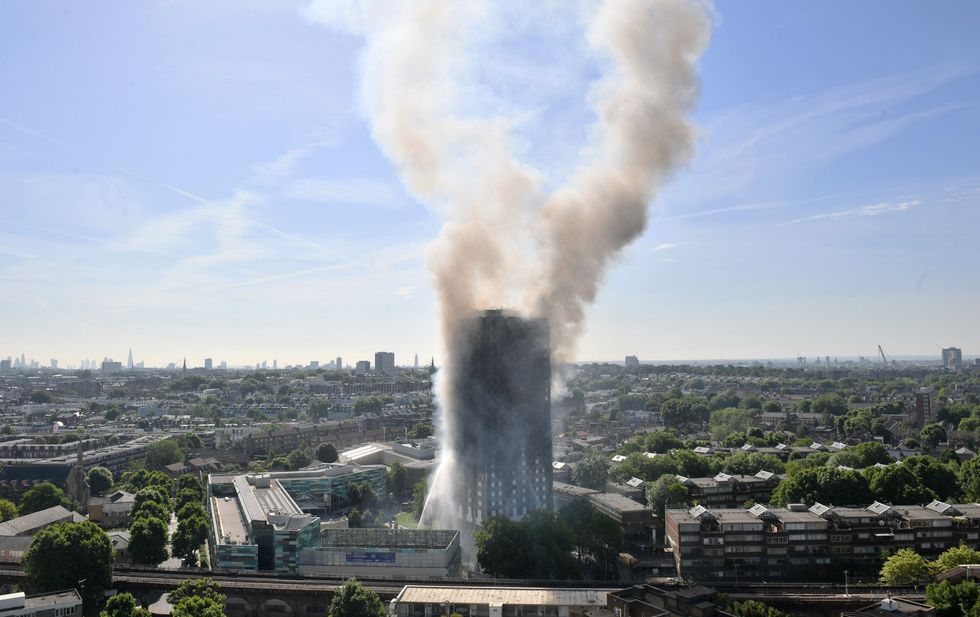Grenfell residents’ 999 calls demonstrate failings by fire service, lawyer says

Smoke billowing from the fire that engulfed the 24-storey Grenfell Tower in west London.
PA Wire/PA Images

Final calls by residents of Grenfell Tower on the night of the blaze laid bare institutional failings of the London Fire Brigade, an inquiry has heard.
Leslie Thomas QC, who represents several residents and families of those who died in the inferno, told the Grenfell Tower Inquiry that control room operators failed to gather “basic” information about callers, such as any vulnerabilities that would affect their ability to evacuate.
Mr Thomas read out harrowing extracts from transcripts of calls from Grenfell residents that he said illustrated the fire service’s failures.
The El-Wahabi family were told by the call handler for nearly an hour to stay in their flat, even when smoke was seeping in and they could see flames next door – advice Mr Thomas said was evidence of the “stay put” strategy having “become a doctrine”.
He said: “In their final calls, the desperation and their fear is tangible; the response of the operator is blunt and callous.”
Grenfell Tower in west London.
Steve Parsons
Father Abdulaziz, 52, wife Faouzia, 41, and children Yasin, 20, Nur Huda, 16, and Mehdi, eight, all died.
Mr Thomas also described how Anthony Disson, known as Tony, made at least six 999 calls and pleaded for help.
When he was finally told to self-evacuate, the 67-year-old with mobility issues died in the stairwell.
“At no point in any of his calls was he asked his age, whether he had any vulnerabilities, including mobility impairment,” Mr Thomas said.
He also pointed to a lack of communication between control room operators, and said no attention was paid to the needs of children and pregnant women.
“As so many drew their last breath, their deaths were not inevitable if only they had been really heard,” he said.
The Grenfell Memorial Wall in the grounds of Kensington Aldridge Academy.
Jonathan Brady
He lamented the impact of austerity measures on fire services and control room conditions, noting that some staff lacked a TV which would have allowed them to watch the fire spreading in real time.
Danny Friedman QC, who also represents the bereaved, survivors and residents, pointed the finger at Government decisions to fragment and localise fire services in 2004, saying that, alongside austerity and deregulation, contributed to the failures to learn lessons ahead of the Grenfell blaze.
He said: “Ultimately, localism was deregulation. The main laws remained in place, but they were left empty of much of their effect.
“Instead, there was fragmentation, lack of oversight and tolerance of sub-optimal competency as regards modern construction.
“And all of that came unstuck at Grenfell Tower with disastrous consequences.”
The lawyers’ comments came during opening statements of phase 2, module 6, of the inquiry, which explores Government failures at the time of the fire.
Martin Seaward, a lawyer for the Fire Brigades Union, said: “The shortcomings of the control room on the night were largely due to systemic failings, a combination of those and the failure of the control room staff to overcome those systemic failings in the harrowing circumstances of the fire.”
But, he said, call handlers “did their best in difficult circumstances”.
He added: “I would ask the panel to review your conclusions to personally criticise the control room staff.”
Stephen Walsh QC, the London Fire Commissioner’s counsel, promised a “genuine and pressing commitment to learn hard lessons in order to bring about meaningful change in the interest of public safety.”
He detailed some of the work being undertaken, which he said represented “the most fundamental and far-reaching review and reform of the (London Fire Brigade) in generations”, including the delivery of a fire safety regulation training programme to every firefighter and operational officer.
The inquiry will resume on Monday at 10am.